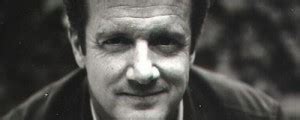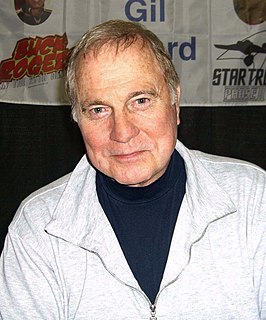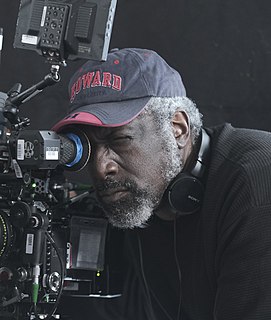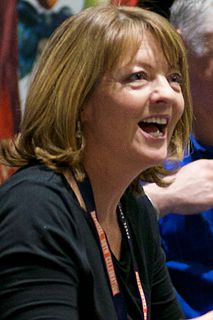Top 1200 Science Fiction Quotes & Sayings
Explore popular Science Fiction quotes.
Last updated on April 15, 2025.
I guess...on one hand, I spent way too much time watching science fiction and reading science fiction when I was growing up. But a part of it is I also never felt much of a connection to the world in which I lived while I was growing up, and so, oddly enough, I think I felt a lot more connected to the worlds that I read about in science fiction.
I define science fiction as the art of the possible. Fantasy is the art of the impossible. Science fiction, again, is the history of ideas, and they're always ideas that work themselves out and become real and happen in the world. And fantasy comes along and says, 'We're going to break all the laws of physics.' ... Most people don't realize it, but the series of films which have made more money than any other series of films in the history of the universe is the James Bond series. They're all science fiction, too - romantic, adventurous, frivolous, fantastic science fiction!
The real origin of science fiction lay in the seventeeth-century novels of exploration in fabulous lands. Therefore Jules Verne's story of travel to the moon is not science fiction because they go by rocket but because of where they go. It would be as much science fiction if they went by rubber band.
Literary science fiction is a very, very narrow band of the publishing business. I love science fiction in more of a pop-culture sense. And by the way, the line between science fiction and reality has blurred a lot in my life doing deep ocean expeditions and working on actual space projects and so on. So I tend to be more fascinated by the reality of the science-fiction world in which we live.
'Filk' is the folk music of the science fiction and fantasy community - you get parodies, you get traditional music that's had the words slightly modified, and you'll also get just original works that have been written about science fiction and fantasy works, or with science fiction and fantasy themes.
Science fiction is the most important literature in the history of the world, because it's the history of ideas, the history of our civilization birthing itself. ...Science fiction is central to everything we've ever done, and people who make fun of science fiction writers don't know what they're talking about.
The main difficulty is finding an idea that really excites me. We live in an age when miracles are no longer miracles, and science and the future are losing their sense of mystery. For science fiction, or at least the type of science fiction I write, this development is almost fatal, but I'm still giving it all I've got.
Science fiction, as I mentioned before, writes about what is neither impossible nor possible; the fact is that, when the question of possibility comes up in science fiction, the author can only reply that nobody knows. We haven't been there yet. We haven't discovered that yet. Science fiction hasn't happened.
I do think that science fiction ideas are best expressed through visual media like film and TV. Realist literature depicts things that we have seen in life, but science fiction is different: what it depicts exists only in the author's imagination. When it comes to science fiction, the written word is inadequate.
Science fiction is a weird category, because it's the only area of fiction I can think of where the story is not of primary importance. Science fiction tends to be more about the science, or the invention of the fantasy world, or the political allegory. When I left science fiction, I said "They're more interested in planets, and I'm interested in people."
Science fiction is fantasy about issues of science. Science fiction is a subset of fantasy. Fantasy predated it by several millennia. The '30s to the '50s were the golden age of science fiction - this was because, to a large degree, it was at this point that technology and science had exposed its potential without revealing the limitations.
It had also been my belief since I started writing fiction that science fiction is never really about the future. When science fiction is old, you can only read it as being pretty much about the moment in which it was written. But it seemed to me that the toolkit that science fiction had given me when I started working had become the toolkit of a kind of literary naturalism that could be applied to an inherently incredible present.
Being a fan of science fiction, I collect a lot of science fiction art work and so if you go to my house there's like a library and you just geek out on science fiction material. A lot of the colony worlds specifically are built as a melting pot of different societies, because the world is at a point where there are only two zones that are left inhabitable.
I would say that most of my books are contemporary realistic fiction... a couple, maybe three, fall into the 'historic fiction' category. Science fiction is not a favorite genre of mine, though I have greatly enjoyed some of the work of Ursula LeGuin. I haven't read much science fiction so I don't know other sci-fi authors.
I often use detective elements in my books. I love detective novels. But I also think science fiction and detective stories are very close and friendly genres, which shows in the books by Isaac Asimov, John Brunner, and Glen Cook. However, whilst even a tiny drop of science fiction may harm a detective story, a little detective element benefits science fiction. Such a strange puzzle.















































